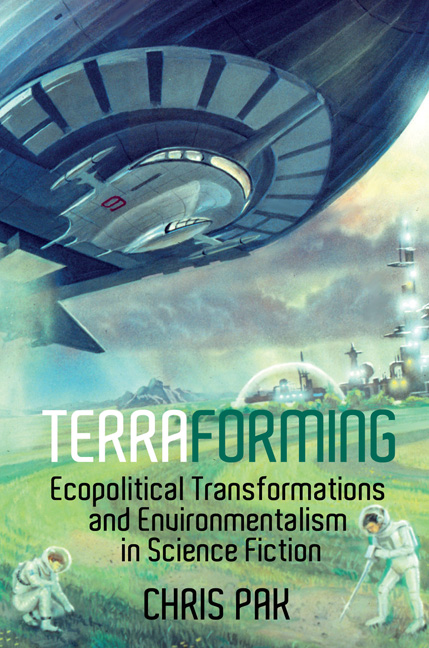Book contents
- Frontmatter
- Dedication
- Contents
- Acknowledgements
- Introduction: Terraforming: Engineering Imaginary Environments
- 1 Landscaping Nature's Otherness in Pre-1960s Terraforming and Proto-Gaian Stories
- 2 The American Pastoral and the Conquest of Space
- 3 Ecology and Environmental Awareness in 1960s–1970s Terraforming Stories
- 4 Edging Towards an Eco-cosmopolitan Vision
- 5 Kim Stanley Robinson's Mars Trilogy
- Conclusion
- Works Cited
- Index
1 - Landscaping Nature's Otherness in Pre-1960s Terraforming and Proto-Gaian Stories
- Frontmatter
- Dedication
- Contents
- Acknowledgements
- Introduction: Terraforming: Engineering Imaginary Environments
- 1 Landscaping Nature's Otherness in Pre-1960s Terraforming and Proto-Gaian Stories
- 2 The American Pastoral and the Conquest of Space
- 3 Ecology and Environmental Awareness in 1960s–1970s Terraforming Stories
- 4 Edging Towards an Eco-cosmopolitan Vision
- 5 Kim Stanley Robinson's Mars Trilogy
- Conclusion
- Works Cited
- Index
Summary
The 1960s saw the consolidation of a growing awareness of environmentalism. Rachel Carson's 1962 Silent Spring popularised the American environmental movement, while James Lovelock first conceived the basis for the Gaia hypothesis in 1965. Their writings influenced the developing environmental movement, if not always in ways that Lovelock approved of, yet prior to the 1960s sf had engaged with ideas that anticipated and fed into modern environmental philosophy and what Lovelock now refers to as Gaia theory. Anna Bramwell traces the growth of ecological awareness from its origins in the 1880s and notes how the scientific romances of writers such as H.G. Wells incorporated ecologically inflected concepts into their narrative explorations of the relationship between nature and politics. Bramwell differentiates between ecologism, which is concerned with global social and economic change, and environmentalism, which diverged from ecologism in the 1930s to focus on specific problem-solving at localised political levels (1990, 104–05).
Terraforming stories explore the otherness of nature, a view that opposes the interconnectedness without boundaries that deep ecology endorses. Links have been forged between holist approaches to the physical sciences raised by the Gaia hypothesis and the deep ecology movement. Val Plumwood explains that ‘dominant forms of deep ecology choose for their core concept of analysis the notion of identification, understood as an individual psychic act rather than a political practice’ (1993, 17). In its weaker formulation, recognition of nature's otherness can be considered a form of deep ecology when it is understood simply as an attention to ‘the interconnectedness of the natural world (as in some sense the bearer of non-instrumental value) and humanity's place within it, so as to effect fundamental social change that will bring humanity to its proper place’ (Hailwood, 2004, 36). Deep ecology's strong identification with nature, however, raises problems for recognising nature's otherness. Citing Bill Devall and George Sessions's claim that ‘“to the extent that we perceive boundaries, we fall short of deep ecological consciousness”’ (121), Hailwood argues that stronger forms of holism often associated with the Gaia hypothesis are incompatible with the recognition of difference involved in conceptions of nature's otherness (36).
- Type
- Chapter
- Information
- Publisher: Liverpool University PressPrint publication year: 2016

